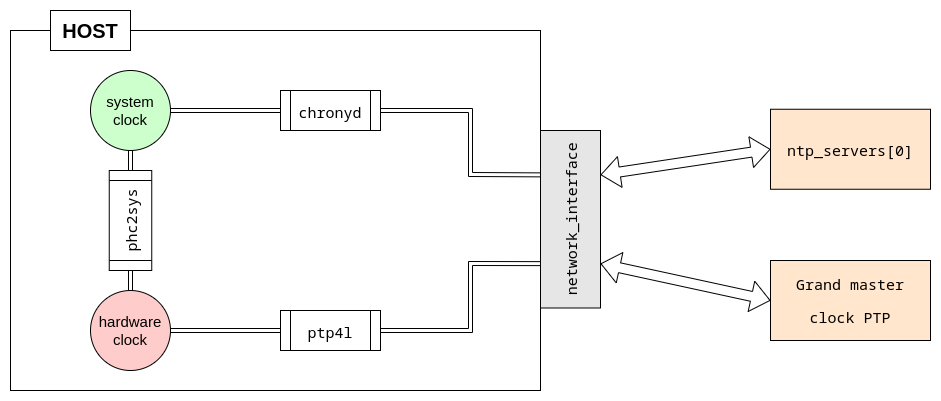...
The hosts synchronize the time with both NTP and PTP. This is done by the timemaster service during the network configuration section. (see see Network architecture section section).
Three tools are used:
chronysynchronize the system clock with NTP. The NTP server can be configured to be on the local network or on the internet.ptp4lsynchronize the hardware clock (PHC) with PTP.phc2syssynchronize hardware and system clocks.
To see the status of the clocks and the delay with the references, use the command
...
Load the kernel module
ptp_kvm, either automatically at boot or manually.
This will create the a ptp device in/dev/ptp0 device, which is the PTP clock.To determine which device is the one created byptp_kvm, simply check that the file/sys/class/ptp/ptp*/clock_namedoes indeed say "KVM virtual PTP".
In this example, ourptp_kvmdevice is ptp0.Synchronize the system clock with the PTP clock.
...
| Code Block |
|---|
[Global] slaveOnly 0 gmCapable 1 domainNumber 0 # Announce interval: 1s logAnnounceInterval 0 # Sync interval: 1 s logSyncInterval 0 # Pdelay interval: 1 s logMinPdelayReqInterval 0 # Announce receipt time-out: 3 s (fixed) announceReceiptTimeout 3 priority1 128 priority2 128 # Default clock class : any specialised clock will be better (ie a GPS Grand Master Clock) #clockClass 192 network_transport L2 delay_mechanism P2P clockClass 248 clockAccuracy 0xFE offsetScaledLogVariance 0xFFFF |
| Info |
|---|
The PTP clock created by ptp4l will not be synchronized with the current time. So even if your cluster machines are synchronized with each other, the date will be random. phc_ctl <ptp_interface> set |
Troubleshooting
rogue peer delay response
...
